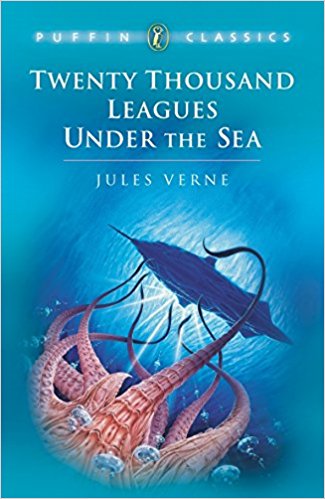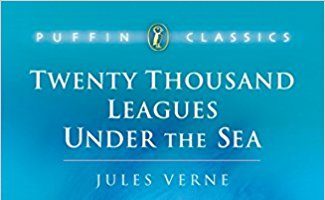 20,000 Leagues Under The Sea by Jules Verne
20,000 Leagues Under The Sea by Jules Verne
Classic Sci-Fi
An American frigate, tracking down a ship-sinking monster, faces not a living creature but an incredible invention — a fantastic submarine commanded by the mysterious Captain Nemo. Suddenly a devastating explosion leaves just three survivors, who find themselves prisoners inside Nemo’s death ship on an underwater odyssey around the world from the pearl-laden waters of Ceylon to the icy dangers of the South Pole . . .as Captain Nemo, one of the greatest villains ever created, takes his revenge on all society.
Why I chose this book
My friend and fellow writer Kristen Kooistra does a reading challenge of classic novels every year. I decided to read this one with her because I’ve not read it before and because I really enjoyed 80 Days Around The World as a child.
Rating/content
I give this book 1 out of 5 stars.
It’s a classic sci-fi which hasn’t aged well. The long sea voyage has the feel of a descriptive travelogue rather than an adventure. It’s a clean read with the exception of some violence – in particular, hunting and slaughtering sea creatures.
Warning: this review contains spoilers. Partly because its a classic which many will have read anyway, and partly because if you haven’t read it, I wouldn’t recommend bothering anyway. Just read my review instead. This book annoyed me so much that I’m going to ramble on about it.
The good and the bad
I’m going to mix good and bad points together in one narrative in this review, rather than splitting them, because I have a lot to say and it’s better covered chronologically.
It’s surprising that I actually managed to finish this book given my overall opinion of it. But there were some good parts in there. I enjoyed the first 15%. The book starts well, describing a professor hunting for a giant sea monster which actually turns out to be a giant submarine manned by Captain Nemo.
The professor and his companions are held captive on the submarine by Nemo, a recluse who’s severed ties with the mainland. His futuristic submarine and the sea surrounding it has all he needs to sustain life for him and his crew.
It’s an awesome premise, right? Unfortunately things go downhill from when they enter the submarine. The plot grinds to a halt. The book is weighed down with pages and pages and pages of description. Fish, sea creatures, classification of fish, the contents of the submarine, the mechanism of the submarine… Just when you think he can’t describe anything more, they see more fish.
The submarine itself is pretty cool. And the idea of being able to live off the sea (food, clothes, power, etc.) is also very cool. However it reads like Verne got the notes for his first draft and cobbled them together into a book. Worldbuilding is one of my favourite things, as you probably know if you hang around this blog, but worldbuilding needs a story to hang on. The setting should enhance the story. It shouldn’t BE the story.
So the book continues and… Nothing happens. They travel around the world on a submarine. They take a few underwater walks and see more fish. Then they see some more fish. And oh look, fish.
Now, from a sci-fi point of view, I admit I know next to nothing about submarines, diving, water, sea life, etc. However my co-reader Kristen is more well-informed than I and tells me that Verne got an awful lot of stuff wrong and it reads like he didn’t do much research at all. This didn’t bother me too much, being relatively ignorant, but it did reduce the credibility of the book in my eyes. A book written like this in the 1800s would have had the aim of informing the public about things they had no access to (unlike today where you can Google information). Knowing a lot of it is misinformation is irritating. Writers really can’t get away with that today. Sure it’s sci-fi, but even at the time it was near future sci-fi set on earth.
The “adventure” continues. Basically they do a round the world tour. The 20,000 leagues refers to the distance travelled horizontally under water, not downwards, which is what I’d always assumed. I’ve got no idea how far a league is though, to be honest.
There are a couple of good bits in the adventure. An underwater tunnel. Discovering Atlantis. Nearly getting trapped at the South Pole. But tension is lacking throughout. The only point where I actually fear for the lives of these guys is during the South Pole bit which is at the 85% mark. At one point, Nemo becomes agitated on sighting something and I think we’re going to learn the mystery of why he’s an underwater nomad, but he locks up the point of view character and drugs him for the duration of the incident so we know nothing about what happens. This irritated me no end.
The other big issue I had throughout was their attitude towards hunting of animals. Now I know that hunting for sport was culturally more acceptable at the time. And from time to time the main characters justify their need for hunting by the need to eat. But there are instances where they say, oh look, this animal’s nearly extinct, but we’re hungry so we’ll kill it anyway.
The worst bit was when they decide not to kill some friendly baleen whales (whatever they are) but then proceed to annihilate a school of a few hundred sperm whales because Nemo thinks sperm whales are evil. I was incredulous and shocked reading this section.
So, you may ask, why did I keep reading? Primarily because I wanted to learn who Nemo was and why he had isolated himself and to see his revenge. Well, this was a real let down. His revenge involved destroying a ship. But we learn absolutely zero about why he did it and his origins. I felt cheated. The professor escapes from the submarine in the end, none the wiser. And I was left wondering why I bothered.
Overall
If this book was revised and edited and had a decent ending that explained more about Captain Nemo, I’m sure it would make an excellent short story. Because that’s all that would be left after you took the dross out.
Not recommended. Unless you really really like fish…


Really, really, REALLY like fish. And giant paragraphs of mechanics and distances. I definitely think a smaller book(aka do some heavy edits) and more research would’ve made this miles better. On one hand I do feel like he couldn’t readily access information like we can, but on the other that means his readers couldn’t either. So every time he said something harebrained like sharks having to bite upside down or this animal eating something they don’t actually eat . . . it means people believe him for who knows how long. Might even believe him still since it takes a lot of time to research everything he says.
Yeah, I looked a couple of things up at first but then I kind of lost the will to live 😀